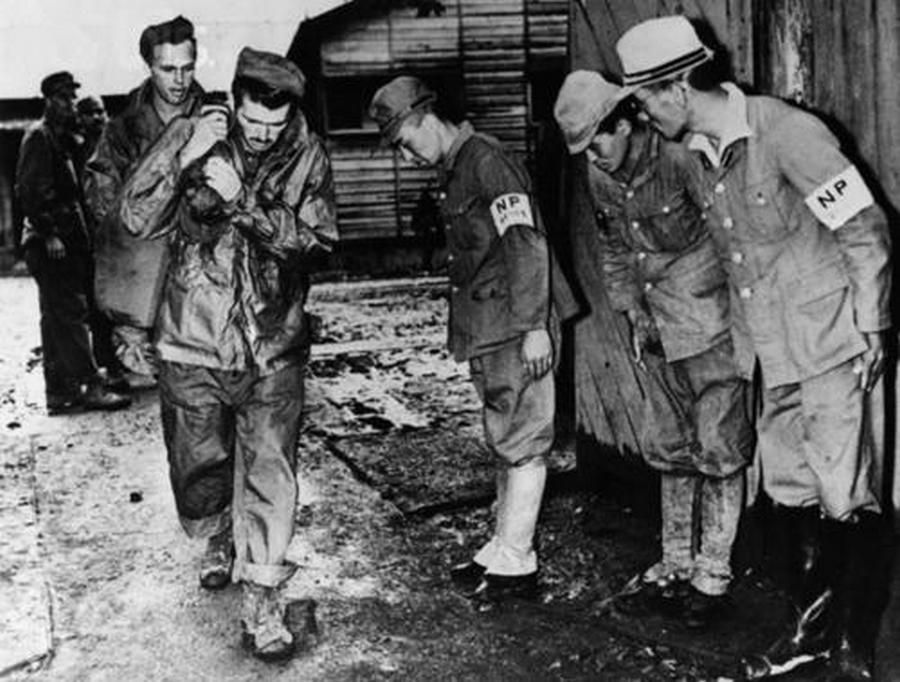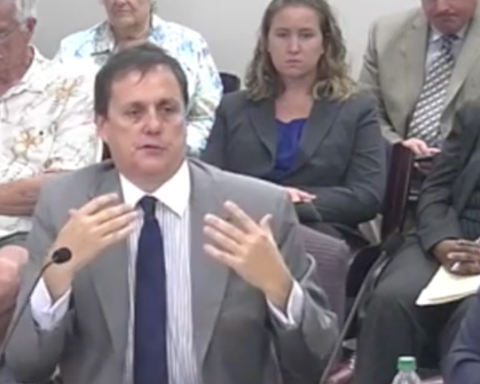
Think you’ve had a bad day from which you might not recover emotionally?
Randall Edwards had almost three-and-a-half years of them in a Japanese slave labor camp then went on to finish his naval career and another as an electrical engineer at Oak Ridge National Laboratory.
Sunday, he will turn 100 years old.
Friends, family and officials gathered in Lakeland on Saturday for his birthday party.
Edwards joined the Navy in 1935 after growing up and going to school in “one room school houses all over we Wyoming, Nebraska, Colorado and Montana,” the son of an itinerant father.
He was the flag Radioman for the American Asiatic fleet when the Japanese struck the Philippines Dec. 8, 1941. The fleet later left for Australia during the Japanese five-month siege of the islands.
Edwards stayed behind on the crew of the submarine tender, USS Canopus, which the crew disguised as an abandoned vessel.
“We hid in the woods during the day and at night came back and refueled and restocked the subs, even made them ice cream,” he said.
“They went off to sink Jap ships up the coast, but the damned firing pins on the torpedoes wouldn’t fire,” in a stern brusque voice of a veteran military man.
Gen. Douglas MacArthur left the islands for Australia under presidential orders. Once the inevitable seemed imminent Edwards and the crew scuttled the Canopus on April 10, 1942, and swam to Corregidor.
As fleet Radioman, he translated the secret messages from Naval headquarters.
“The last one I translated was ‘We can’t come to help you,’” he said.
On May 6, 1942, Gen. Jonathan Wainwright surrendered all troops in the Philippines to the Japanese.
Don’t mention the names of Wainwright or MacArthur to his father, son Dr. James Edwards said.
Since he was on Corregidor at the time of surrender, Edwards said, he was not a part of the infamous Bataan Death march. Instead, he and other prisoners were sent to a prison camp in Manchuria and forced into slave labor for the MKK Corp. which became the Mitsubishi Tool Works.
In 2015, Mitsubishi Materials Corp. sent representatives to the United States to apologize. The Wiesenthal Center reported that it was the only one of dozens of Japanese companies that used prisoner of war slave labor to apologize.
“Dad said on Aug. 1 (1945) he looked out and saw the Japanese commandant walking around outside the wire in the kill zone. He found an American colonel sitting at his desk in the compound,” said his son James.
Randall Edwards said the American prisoners in Manchuria had been freed by the OSS (the forerunner the CIA) and Russian soldiers, who were as brutal to the Japanese guards as they had been to the prisoners.
But bad days were yet to be over for the Navy Radioman, his son added.
“The Victory Ship transporting prisoners back to freedom hit a mine,” James Edwards said.
Edwards said when freed he wasn’t letting anything stop him from a full life.
“I said to myself I am going to cut a path a hundred miles wide across the country; get married, go to school have a life.”
Receiving a Silver Star and other commendations, Edwards retired from the Navy with the rank of warrant officer in 1955. He entered the University of Florida receiving an engineering degree. He then worked for the nuclear research facility at Oak Ridge until the 1970s.
But it didn’t stop there; the Veterans Administration trained him to be an advocate for veterans who had been prisoners of war. Edwards had helped many former POWs to get benefits they were entitled to but didn’t know how to receive.
After presentations from a congressman’s representative and a letter from the Secretary of The Navy by a Navy lieutenant, Edwards said to the crowd, “I would like to welcome you to my second-century birthday party which will be on July 22, 2117.”






